
views
Rabbit-Proofing Your Apartment

Confirm that your apartment allows rabbits. Whether you’re moving to a new place or have already moved in, you always need to check your landlord’s animal rules before getting a pet. This is especially important with rabbits, because they love to chew and can cause some serious damage for such a small animal. Confirm that rabbits are allowed before getting one. Don’t assume that an apartment allows rabbits just because it allows dogs and cats. Many landlords put rabbits in a different category, so asking is the best bet. If a landlord doesn’t explicitly say that they don’t allow pets and you aren’t sure, then make an appointment to see the place and give a good impression before mentioning your pet. They might be more willing to make an exception if you seem like a good tenant.
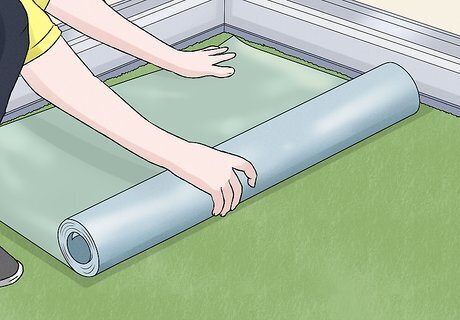
Put plastic carpet protectors in room corners if you have carpeting. Rabbits love to dig, and they have a habit of digging into carpets in corners. If you do have carpets, put down plastic carpet protectors in the corners, the same type you'd use under a computer chair or desk. You could also just block off carpeted areas instead. Make sure you put some hay in your rabbit’s enclosure so it can dig there. This can distract it from digging at carpets.
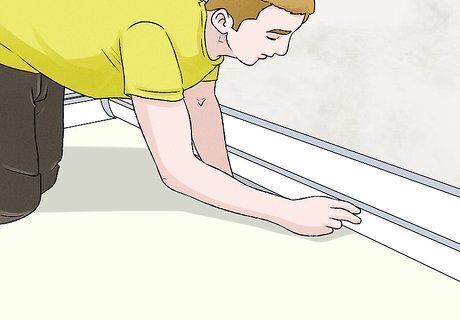
Use baseboard covers to protect your walls. Baseboards are the perfect height for rabbits to chew on, and their little teeth can do some real damage. Luckily, hardware stores sell baseboard covers that can prevent this. Get some of these and install them over the baseboards to protect your walls. Using furniture or boxes to block off the baseboards is another option, but it might not be practical to do this through your whole apartment. You could also use something like bitter apple spray to make walls and wood furniture taste bad. This might stop your rabbit from chewing on them.
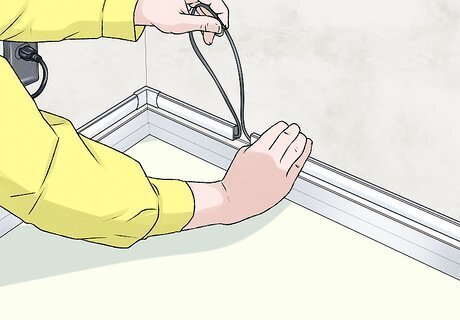
Block off areas with wires so your rabbit can’t chew on them. Rabbits have a habit of chewing on wires, which can not only cut your power, but could hurt your rabbit. Go through your apartment and try to block off spots that have a lot of wires. Common spots are behind your TV, on your desk, near your router, and around any appliances. If you can’t block off these areas, try to raise the wires up so your rabbit can’t reach them. You can get little plastic attachments at most hardware or electronics stores to stick wires to your walls and raise them up. Tape also works. Make sure you check your entire apartment to find any wires that you might’ve missed. Your rabbit can fit into small spaces and might uncover some wires to chew on.
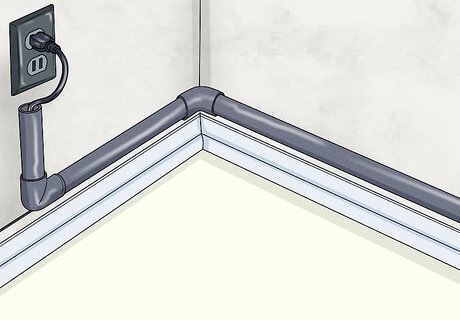
Wrap wires in coating to protect them. Whether you can’t block off all your wires or you just want to be extra careful, protective coating can also stop your rabbit from biting through them. Try getting metal or plastic coatings from an electronics store and wrapping them around your wires for an extra layer of protection. These coatings are just a precaution, and your rabbit could still bite through them with some extra work. Make sure you keep an eye on your rabbit and stop them from biting any wires.
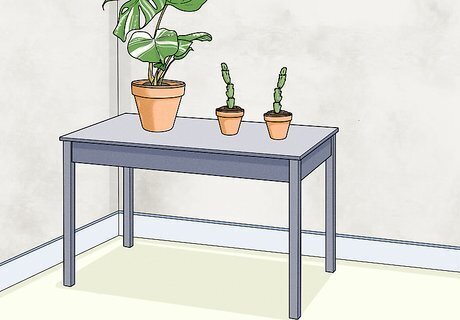
Raise houseplants so your rabbit can’t reach them. Most houseplants are toxic to rabbits, but this won’t stop your rabbit from trying to eat them. Make sure your raise all your houseplants high enough so your rabbit can’t reach them at all.
Setting Up Your Rabbit’s Space
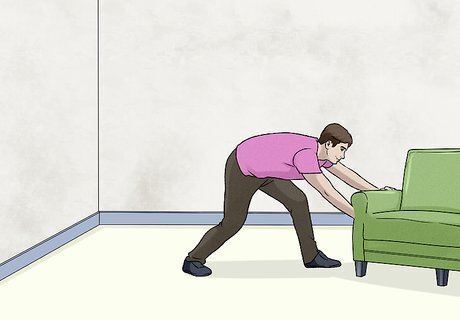
Pick a roomy, quiet spot for your rabbit’s living area. Even if you’re going to let your rabbit roam the apartment, it’s best for rabbits to have a home base to rest, eat, use the bathroom, and play. Start by choosing a roomy spot large enough to set up a big cage or enclosure. Make sure it’s a quiet spot, but not too far away from everyone else so your rabbit doesn’t feel lonely. If you’re in a small apartment, you might have to rearrange some furniture to make room. If you have enough space, you could make a whole room your rabbit’s living area. This way, you can just focus on rabbit-proofing that room instead of your whole apartment.
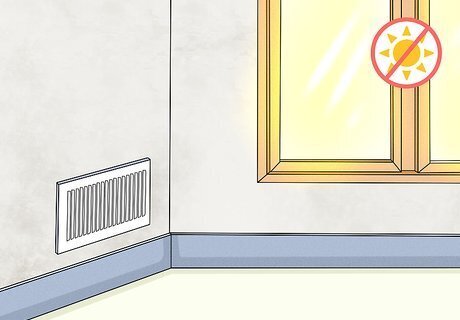
Keep your rabbit in a cool spot away from direct sunlight. Make sure your rabbit's living space is cool and away from any heating vents, since they can overheat easily. Also make sure the area doesn't get any direct sunlight. You might have to use shades to block sunlight and keep your rabbit comfortable. Any drafts could make your rabbit uncomfortable, so make sure to close any vents or set up the living area out of their paths.
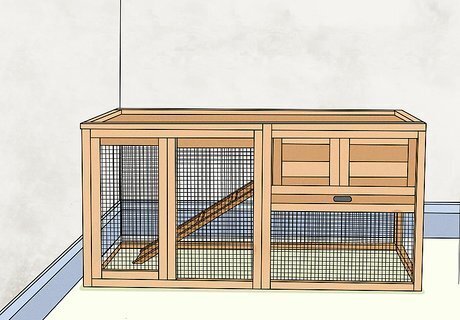
Set up a cage or pen for your rabbit. In general, get housing that’s at least 4 times longer than your rabbit and twice as wide, but bigger is better because your rabbit will grow. You can use either a large cage designed for rabbits or a gate to create an enclosure. You could keep your rabbit penned in their housing most of the time, which makes protecting your apartment easier. That way, you can easily watch them while they’re running around and stop them from chewing anything. Make sure any housing you use for your rabbit has flat flooring. Wire flooring is bad for their feet and they might dig into carpeting.
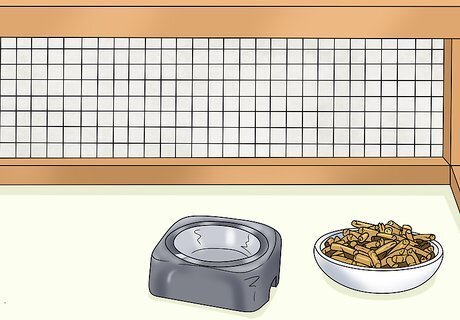
Include food and water in the rabbit’s cage. Rabbits like to eat in their living area, so make sure to set these up as well. Put your rabbit’s food bowl in the cage or enclosure, and hang their water bottle so they can drink whenever they want. This is important whether you have a caged or free-roam rabbit. Leave their food and water in their normal living area.
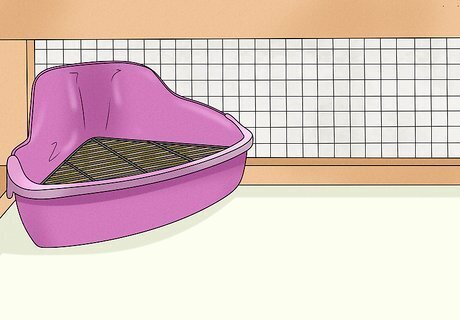
Put a litter area in the rabbit’s pen. Rabbits can be house-trained, which is very important for keeping one in your apartment. Setting up a litter area in your rabbit’s pen is very easy. Just put some crumpled up newspaper in a pan for your rabbit to use. Make sure you clean the litter area daily. Don’t use wood chips or kitty litter in your rabbit’s litter area. These can be toxic to rabbits.
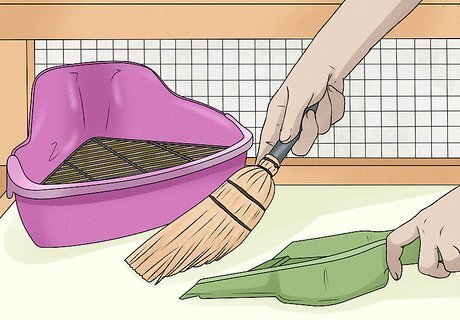
Clean your rabbit's living area weekly. Rabbits tend to be clean, but their living areas will inevitably get messy and smelly. Hair, old straw, and food bits can build up fast. Once or twice a week, do a full cage cleaning. Scoop out any old food or hair and wash the floor with soap and water. Put fresh straw, cardboard, and newspaper in the cage and let it dry before letting your rabbit back in. You can let your rabbit roam or put them in another cage while you're cleaning. Clean the area around the cage too, especially if it's carpeted. Vacuum and sweep any hairs, food, or straw so it doesn't start smelling.
Caring for Your Rabbit

Spay or neuter your rabbit. Fixing your rabbit solves a lot of behavioral issues like chewing and aggression, and it also makes house-training easier. In general, you should fix your rabbit between 3 1/2 and 6 months old, so visit a vet for the right procedure. If your landlord is on the fence about letting you keep a rabbit, emphasizing that neutering solves many issues could help convince them.
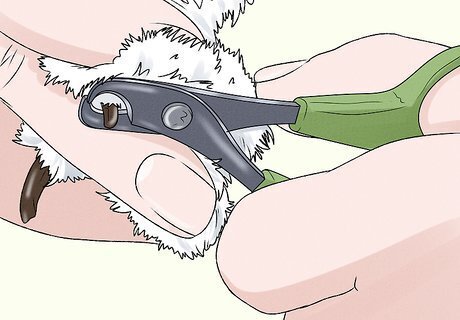
Trim your rabbit’s nails regularly. If your rabbit has long nails, they’re more likely to damage your walls, floors, and carpets. Inspect your rabbit’s nails regularly and give them a trim if they’re long. In general, a monthly trim is perfect. As soon as the nail starts curving, it needs to be clipped. If you don’t know how to cut your rabbit’s nails, your vet can show you.
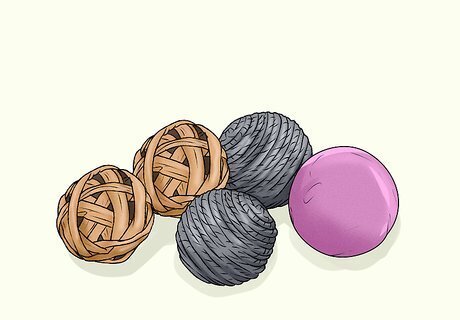
Give your rabbit plenty of toys to chew on. Rabbits are more likely to chew on furniture and walls if they’re bored. Make sure your rabbit has plenty of chew toys to keep them busy. This way, you can cut down on the amount of chewing they do around your apartment. You can get rabbit chew toys from a pet store. Rabbits also like chewing on cardboard, so try using some old boxes or toilet paper tubes for an inexpensive option. Rabbits also love to play with non-toxic baby toys, so you can get some of these too.
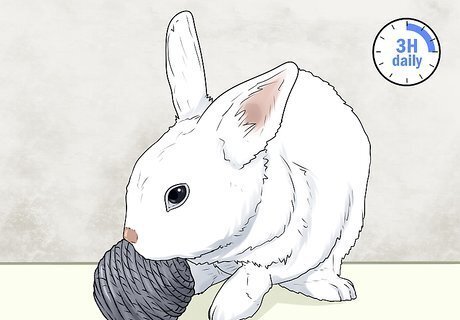
Let your rabbit exercise for at least 3 hours a day. While they're tiny, rabbits are energetic animals and need to move around a lot to stay in shape. In general, they need at least 3 hours of exercise each day, so let yours out of its enclosure every day to move around. Rabbits exercise by hopping, chewing, playing with toys, and just generally exploring, so your rabbit should be able to take care of itself once you let it roam a little. This might be a little tougher in an apartment, but you don't need much room. As long as your rabbit has enough time and space to hop around, then it should be able to get plenty of exercise. Keep an eye on your rabbit while it's roaming. Make sure it stays away from any wires, windows, or your front door.

Spend time with your rabbit so it stays happy. Rabbits need attention just like any other pet. Play with your rabbit and spend time with it every day. This keeps them happy and social. Rabbits don’t usually like being picked up, so don’t do this too much. You could let them sit or lay next to you while you’re on your couch to enjoy some connection instead. Rabbits are happy in groups, so you might want to consider getting another one so your rabbit has a friend. However, only do this if you’re sure you can take care of more than one rabbit.
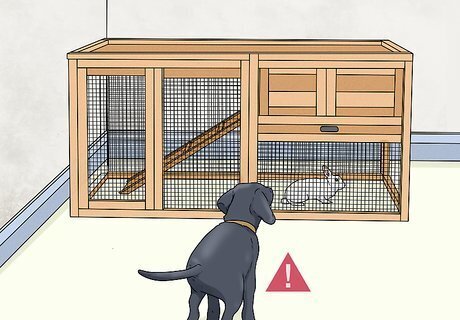
Protect your rabbit from other pets. While rabbits can definitely live together with other pets, you have to make sure your rabbit is protected at all times. Dogs or cats are natural hunters, and might go after your rabbit if they aren't introduced properly. Make sure the rabbit's living area is totally safe from other pets and they can't get in there. When you're letting your rabbit roam, keep an eye on all your pets so no accidents happen. If possible, make sure your other pets are well-trained and respond to commands before adding a rabbit into the mix. This should prevent any problems. Rabbits are sensitive to loud noises, so a barking dog could spook yours. If your dog starts barking, try to get it to quiet down.


















Comments
0 comment